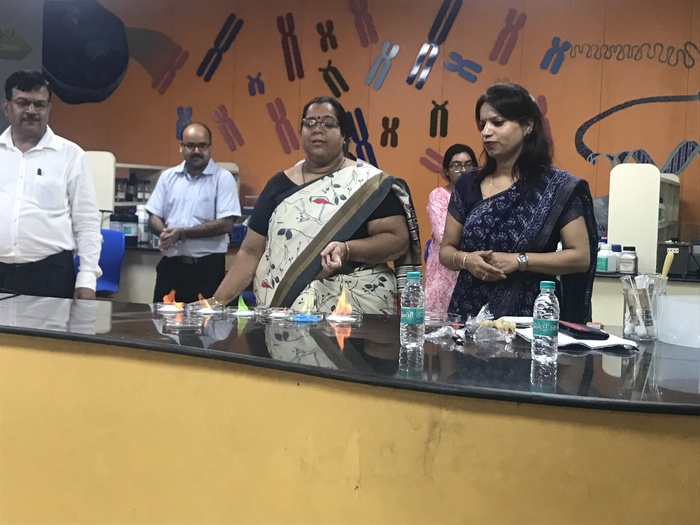NSC workshop for science teachers
A two-day workshop for science teachers was conducted by the National Science Centre on August 28 and 29, 2019. The session aimed at demonstrating existing experiments and developing new popular projects in chemistry. Ms Kriti Chhabra represented The Indian School at the event, which saw the participation of forty teachers from several schools of Delhi-NCR.
The coordinator of the workshop, welcomed the delegates and gave a brief introduction to the periodic table and its significance. The session began with a demonstration on Green Chemistry by distinguished speakers from Hindu College, Delhi University. Dr Meenu Srivastava engaged the participants in a discussion on the 12 principles of Green Chemistry. She shared with the audience the darker side of chemistry and the benefits of Green Chemistry for a sustainable world.
Next, Dr Dinesh Kumar demonstrated how biodiesel can be synthesised from rancid oil followed by the solvent-free synthesis of Azomethine. Dr Geetika Bhalla explained how silver nanoparticles can be prepared from a tea leaves extract and showed a video on the preparation of gold nanoparticles.
One of the things that set science activities apart, is the care with which observations are made and data is recorded. The same was reinforced by Mr Rakesh Tripathy, member of the National Science Centre, through a series of activities to enhance the teaching-learning process in schools. He demonstrated several interesting activities like Rainbow Fire, Chemical Mocktail, Fake Blood, Elephant Toothpaste etc.
The learned resource person imparted information on how to select an appropriate activity for a particular topic. An energetic brainstorming session ensued to develop new experiments of chemistry. The teachers were divided into groups of three and asked to come up with interesting and innovative experiments. One of the groups demonstrated the changing states of Manganese using water, Potassium Permanganate, Sucrose and Sodium Hydroxide. It was observed that Manganese showed different colours for different oxidation states.
Ms Mamta Kothari, jewellery designer explained the four stages involved in the designing of gold jewellery: inspiration, motif creation, design thinking, drawing and rendering.
[gallery link="file"]
In the end, Professor RK Parashar, NCERT, focused on some important easy- to-perform experiments that help a child understand chemistry better. He took Hydrogen Peroxide in a boiling tube and diluted it, followed by the addition of a pinch of Manganese Doxide. He brought an incense stick near this test tube to explain the effect of a catalyst on redox reactions. Some of the other experiments that he demonstrated were related to endothermic reactions, the electrochemical cell, Ostwald's dilution law, water cycle and microchemistry.
The workshop was an opportunity to learn and widen the horizon of one's knowledge in the field.













